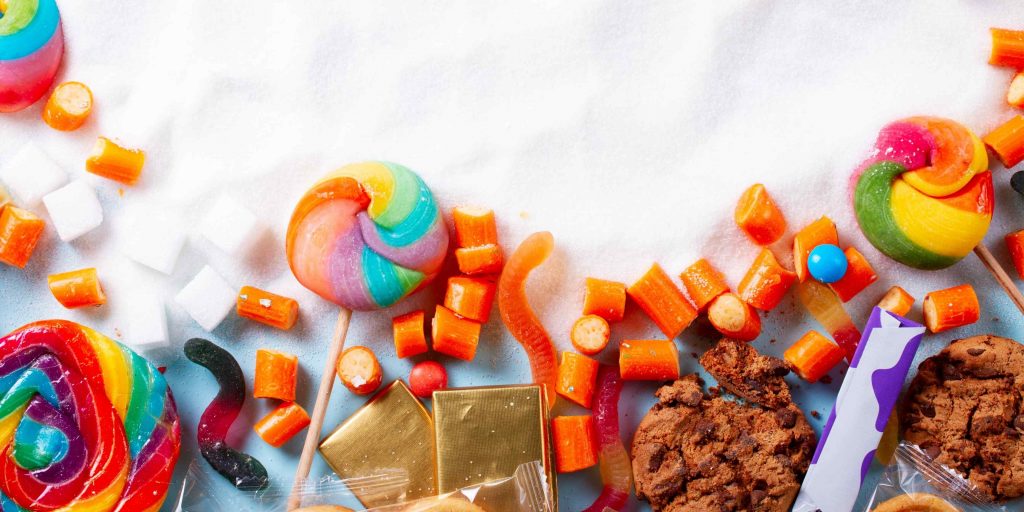The benefits of reducing sugar in your diet

According to a WHO report in 2019, diabetes was the ninth most common cause of death, with an estimated 1.5 million deaths directly caused by diabetes. The number of people with diabetes has increased from 108 million in 1980 to 422 million in 2014. The statistics clearly show that the problem of diabetes is getting worse all the time. Today, 27 June, is World Diabetes Day and we want to use this day to further raise your awareness of this important issue, show you ways to reduce sugar in your diet and the benefits of doing so.
Diabetes and the body’s carbohydrate balance
Carbohydrates are one of the basic building blocks of our body and are essential for its proper functioning. They have energy, storage, transport and building functions in the body. Diabetes mellitus is a disease of disturbed carbohydrate metabolism in the body. It results from an abnormal production or action of insulin, the hormone that regulates blood sugar levels. The primary result of abnormal insulin action or production is hyperglycaemia, which, when occurring chronically, leads to damage to many body systems, especially the nervous and circulatory systems.
Of the several different types of diabetes, type 2 diabetes is the most common, affecting 95% of people with diabetes. Often, the pre-diabetic phase of type 2 diabetes is insulin resistance, which is a reduction in the tissue response to insulin, resulting in the insulin not doing its job and not lowering blood sugar levels.
Type 2 diabetes is caused by inefficient use of insulin by the body, and the main causes of its occurrence include being overweight and lack of physical activity. So by changing our diet and lifestyle, can we prevent the disease or even cure it in some cases?
Sugars
Monosaccharides (monosaccharides) and disaccharides (carbohydrates composed of two monosaccharides) are commonly referred to as ‘sugars’ and are actually the main source of contention. Hearing this term, many a person would flee in panic, but there is nothing to fear. Sugars are naturally occurring substances found in fruit, vegetables, dairy products and cereals. You will also encounter the term on food labels and in this context it refers to both the sugar added to a product and that naturally occurring in it.
Are all sugars bad?
The biggest controversy surrounds sucrose, the most common form of which is white sugar. However, it is also found in fruit, among other things, and it should be noted that the sucrose found in fruit is exactly the same as that found in white sugar. So is eating fruit unhealthy?
Why do nutritionists recommend eating fruit while eliminating white sugar from your diet?
Fruit vs. white sugar
Although sucrose in the form of white sugar and that found in fruit is exactly the same compound, we can’t put an equal sign between sugar and fruit. In addition to being a source of sugar, fruit is also a source of valuable vitamins, minerals and fibre, which makes digestion and absorption of sugar into the blood much slower and does not cause such high spikes in glucose as, for example, when drinking tea with sugar or other sweetened drinks.
Benefits of limiting sugar in the diet
- lower glucose spikes in the blood
- lower risk of becoming overweight, and in the case of existing overweight and obesity, a reduction in body weight
- improved tissue response to insulin (particularly important in insulin resistance)
- reduced supply of empty calories
- healthier teeth and smoother skin
- prevention of cancer
Ways to reduce sugar in your diet
Fortunately, we live in an age where many sugar substitutes are available. Let’s take a look at a few of them:
Xylitol
Birch sugar, used in the food industry as a sugar substitute. It has a many times lower glycaemic index than sucrose, glucose or fructose and is metabolised with little insulin involvement. It does not cause caries. Excessive consumption of xylitol may cause laxative effect, so be careful with its amount. It is very similar to sugar in structure and sweetness.
Erythritol
Erythritol is a sweetener comparable in sweetness to sucrose and its energy value is 0 kcal. It is not metabolized in the human body and is almost entirely excreted in the urine in an unchanged form, which makes it ideal for people with impaired insulin metabolism (with insulin resistance or diabetes). Like xylitol, it does not cause caries.
Stevia
Stevia is a plant that contains compounds called steviosides in its leaves, which are responsible for its sweet taste. Steviosides are 30-320 times sweeter than sucrose and this wide range is due to the different types of steviosides with different levels of sweetness. Like erythritol, they have an energy value of 0 kcal and also do not alter blood glucose levels, making them suitable for diabetics. When stevia is used, a slightly bitter aftertaste can appear in dishes, so be careful with the amount.
Agave syrup
A sweetener produced from certain species of agave. It is approximately 3 times sweeter than sugar, but has a 4-5 times lower glycaemic index than sugar. In terms of its chemical structure, it consists mainly of fructose, so it does not raise blood glucose levels as much. It should be remembered that such a high content of fructose in large quantities is also not beneficial for the organism, therefore it is not the best substitute for sugar and it should not be consumed excessively.
So is it worth limiting sugar?
Carbohydrates, including sugars, are necessary for our body to function properly and should not be eliminated 100% from our diet. Their most important functions include supplying the brain with energy and creating energy reserves in our muscles and liver in the form of glycogen. It should be remembered, however, that according to the standards set by the WHO, sugar should not constitute more than 5% of our daily energy needs, and limiting it will certainly bring many benefits to the body.
In Fitatu you will find a “Less Sugar” menu plan. The meals you will find in this plan exclude white sugar and basic products containing it, for example (jam, chocolate, etc.). If you want to take charge of your health, this is the perfect opportunity to bet on yourself and give it a try. Despite the sugar restriction, you will find recipes for healthier versions of desserts based on fruit and with sugar substitutes, mainly erythritol.
Also read Facts and myths about sugar.
Example of a full day’s menu
1700 kcal
Breakfast
Egg in bread with smoked salmon and pesto (1x portion)
II breakfast
Apple and yogurt smoothie (1x serving)
Dinner
Fried egg with mashed potatoes, grits and beans (1x portion)
Dinner
Pasta salad with chorizo (1x portion)
Target:
Needs: 1700 kcal
Protein: 20%.
Fat: 30%
Carbohydrate: 50%
2300 kcal
Breakfast
Grilled veggie burger with courgette (1x portion)
Second breakfast
Orange and apple mousse (1x serving)
Lunch
Salmon with vegetables and pesto (1x serving)
Dinner
Courgette stuffed with couscous (1x serving)
Target:
Requirement: 2300 kcal
Protein: 20%.
Fat: 30%
Carbohydrate: 50%
You will find all of the recipes in Recipe Catalogue in Fitatu app.
Fitatu App
Download the application from the Play Store or Apple Store and start counting your macros with us!
Do you prefer the web version? No problem. A basic web version is prepared for our subscribers. And now you can use the LESSSUGAR-G discount code by going to https://www.fitatu.com/app/giftcode and get 29% off your monthly Fitatu Premium.
What else can you find in Fitatu Premium?
- over 1000 recipes plus several new ones every month
- additional plans for intermittent fasting
- the ability to create shopping lists
- a choice of six ready-made menus full of meals to choose
- filtering products and recipes
- more synchronization with fit apps
- access to the application in the web version
- no ads!





